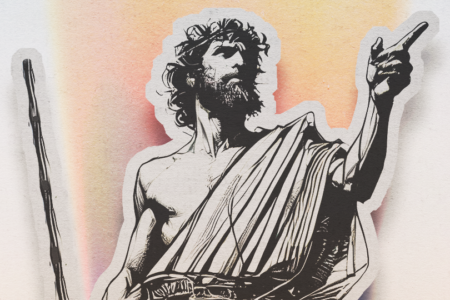Abraham, Man Of Faith
If allocation of space in the Word of God is an indication of subject importance, then Abraham must stand forth as one of the towering personalities in the whole of Scripture. God devotes only 11 chapters (Gen. 1-11) to deal with more than the first 2000 years of history and 14 chapters (Gen. 12-25) to set forth the life of the man, Abraham. No other personality, and few other subjects are given such detailed treatment. Wherein then lies the importance of this man, who left Ur of the Chaldees to enter the land of promise, and fathered the Jewish nation?
A careful consideration of major personalities of the Old Testament reveals some striking characteristics. For instance: Moses is the great lawgiver, giving the nation Israel the Decalogue, and leading them out of Egyptian slavery to the very threshold of the Promised Land.
Joshua, as a great general, guided more than one and one-half million men, women, and children across the Jordan in conquest of the land flowing with milk and honey.
David was not only a brilliant king, but also the sweet psalmist of Israel.
Daniel, that comely lad who was taken captive by the Babylonians, rose to the position of prime minister and, spanning five rulers, must be considered one of the great statesmen of all time.
Elijah is but representative of many of the great prophets of Jehovah who, through God’s enabling power, could restrain the rain or call down fire from heaven.
But when one considers the life and ministry of the man, Abraham, there appears none of the greatness which characterized so many other of God’s choice servants. Again the question is raised, “Wherein then lies the greatness and significance of this man?” The answer is so very obvious that it can almost be overlooked. Three words – that’s all it takes – to define the significance of one of the preeminent personalities in the ‘inscripturated’ revelation: ABRAHAM BELIEVED GOD.
The Apostle Paul in Romans 4:3 and again in Galatians 3:6 states, “Abraham believed God, and it was counted unto him for righteousness.”
Realistically, most Christians realize that they will never be a lawgiver like Moses, a general like Joshua, a poet – king like David, a statesman like Daniel, nor a prophet like Eiijah; but 20th Century Christians can be what Abraham was. He was simply a man – a man who believed God – a man who was convinced that what God had spoken, He would do.
TESTING OF FAITH
That Abraham believed God is the clear, uncompromising testimony of the Word of God. Nowhere is that faith more clearly evidenced than in Genesis chapter 22.
And it came to pass after these things, that God did tempt Abraham, and said unto him, Abraham: and he said, Behold, here I am. And he said, Take now thy son, thine only son Isaac, whom thou lovest, and get thee into the land of Moriah; and offer him there for a burnt offering upon one of the mountains which I will tell thee of (Gen. 22:1-2).
This literal testing of Abraham can be neither dismissed nor minimized. God was asking this man to offer up his son as a sacrifice. Notice that God said, “Take now thy son;” the servant, Eliezer, born in his own household would not do. “Thine only son, Isaac;” Ishmael, the son of Sarah’s handmaid would not do. “Whom thou lovest;” a clear indication that God fully understood Abraham’s feelings toward his son. God requested of Abraham that he kill his son in the land of Moriah. Few things, if any, in all of life could be more difficult than a father taking the life of an only son, yet that is exactly what God requested of Abraham.
To fully understand this testing, it must be seen in the light of the context for Genesis 22 begins with the words, “It came to pass after these things . . . .” It is proper, therefore, to ask, “After what things?” After God had called Abraham from Ur of the Chaldees, He gave to him a number of promises, the most important of which is found in the third verse of Genesis 12, “And in thee shall all families of the earth be blessed.”
In Genesis 13:16 God promised Abraham that his seed would be “as the dust of the earth.” in Genesis 15 God promised Abraham that he would have an heir, and said his seed would be as the stars of the heaven without number. In Genesis 17:19 God promised that his heir would be Isaac. In other words, God had promised Abraham that in his seed all the world would be blessed. God promised that the seed would come through Isaac. He promised that the seed would be as the sand of the seashore and as the stars of the heaven without number.
It is after all these promises made in Genesis 12 and repeated in Genesis 13, 5, and 17, that God says, “Take . . . thy son, thine only son Isaac, whom thou lovest” and kill him. In simple terms the test can be reduced to: ABRAHAM, DO YOU REALLY BELIEVE ME? ABRAHAM, AM I A COVENANT-KEEPING GOD? ABRAHAM, WILL MY RIGHT ARM OF POWER PERFORM WHAT MY MOUTH HAS SPOKEN? ABRAHAM, I TOLD YOU THAT YOUR SEED WOULD BE AS THE STARS OF THE HEAVEN AND THE SAND OF THE SEASHORE: NOW LET ME SEE IF YOU BELIEVE ME. KILL THE SEED OF PROMISE!
OBEDIENCE OF FAITH
It is fascinating to note that there is no objection to God’s test by Abraham. One would think that Abraham would have taken issue with God’s command. After all, hadn’t God made all these promises? Weren’t they centered in Isaac? Yet the Bible narrative is silent; not one word of objection.
It is also interesting to note that Abraham arose early in the morning. One gets the feeling that he slept soundly and was anxious to be on with it. Most men do not particularly like to arise early in the morning, and this certainly would have been an ideal occasion to sleep in. Not so Abraham! He took two of his servants, a donkey, and his son, and started out to the place to which God had directed him.
Arriving three days later at the designated spot, he left his servants behind proceeding with his son to the very place God had chosen – the very spot where the Solomonic and Herodian temple would one day stand, where the Dome of the Rock is now located, and where the future Temple will be rebuilt. Isaac was laid on the altar; the knife was raised, poised to come down into his son’s chest; and at that very moment the voice of God broke through, “Abraham, Abraham, . . . Lay not thine hand upon the lad, . . . for now I know that thou fearest (hast a reverent trust of) God. How victorious this occasion! God was testing Abraham, and he passed the test with highest grades.
TRIUMPH OF FAITH
Still there remains an apparent contradiction for on the one hand God has promised Abraham that through his seed all the nations of the world would be blessed. He promised that that seed would come through the lineage of Isaac. He promised that the seed would be as the sand of the seashore and as the stars of the heaven without number. On the other side, he commanded Abraham to kill the seed. How do we reconcile this apparent contradiction? It is in the doing so that we understand Abraham’s greatness. His trust in Jehovah was so great, his confidence in the immutability of God so strong that Abraham believed if he took his son’s life, God, to be faithful to His Word, had TO RAISE ISAAC FROM THE DEAD.
Notice carefully Genesis 22:5,
And Abraham said unto his young men, Abide ye here with the ass; and I and the lad will go yonder and worship, and come again to you.
The subject is the same in both phrases, “I and the lad will go yonder,” and I and the lad (Hebrew text) will “come again to you.” If that evidence seems inconclusive, then hear the words of the writer to the Hebrews:
By faith Abraham, when he was tested (Genesis 22), offered up Isaac: and he that had received the promises (that in Isaac shall all the nations of the world be blessed) offered up his only begotten son, of whom it was said. That in Isaac shall thy seed be called: ACCOUNTING THAT GOD WAS ABLE TO RAISE HIM UP, EVEN FROM THE DEAD; FROM WHENCE ALSO HE RECEIVED HIM IN A FIGURE.
Abraham’s faith was so strong, so complete, so perfect, that he was convinced that if he took his son’s life, God must raise him from the dead. Is it any wonder that the Apostle Paul in Romans chapter 4 wrote concerning Abraham, “Who against hope believed in hope . . .” (v. 18); “And being not weak in faith . . .” (v. 19); “He staggered not at the promise of God through unbelief; but was strong in faith . . .” (v. 20); “And being fully persuaded that, what he had promised, he was able to perform” (v. 21).
Abraham’s faith is, therefore, set forth repeatedly in the Word of God as that which exemplifies the principle, “The just shall live by faith.”
Dear friend, you and I will never be a law giver like Moses, a general like Joshua, a poet-king like David, a statesman like Daniel, nor a prophet like Elijah; but you and I can be what Abraham was – just a MAN, but a man who BELIEVED God.
Are you familiar with that little chorus, “Every promise in the Book is mine, every chapter, every verse, every line . . .”? Do you really believe God even when you are between a rock and a hard place, when everything seems to be coming unzipped, and when your world seems to be falling apart all around you? At times like those, remember Abraham! He “believed God, and it (his belief) was counted . . . for righteousness.”
Marvin J. Rosenthal







